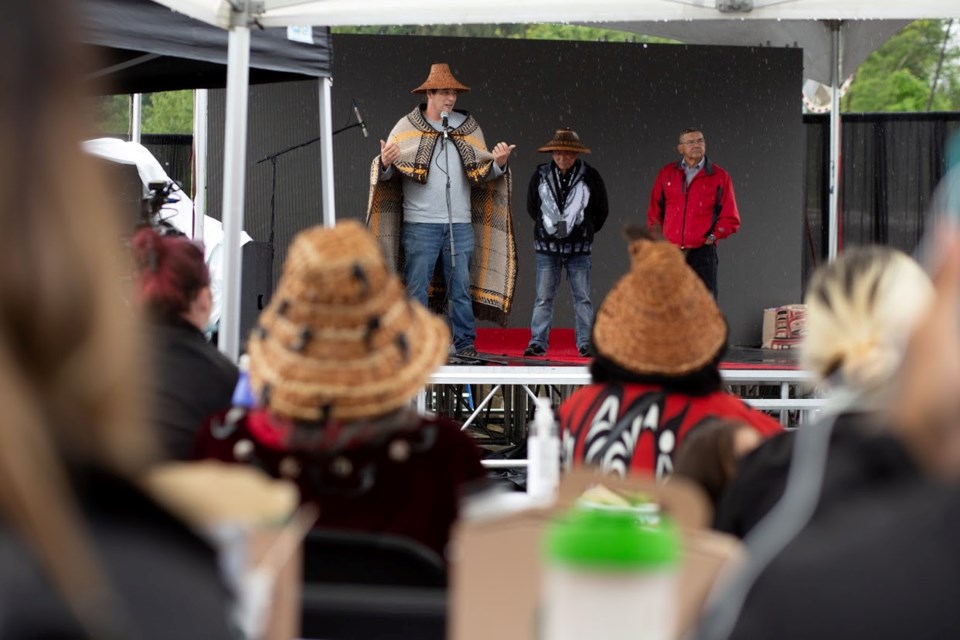The Kwikwetlem First Nation celebrated last week after band members voted to remove federal authority over how they manage their land, and in so doing, laid the groundwork for a new code to govern the development of their territory.
Turnout for the vote, which was announced to members at the end of May, was over 68%, with two-thirds of voters choosing to remove the land administration sections of the Indian Act from their title lands.
Known as the Fundamental Land Law of kʷikʷəƛ̓əm, the land code applies to all of KFN’s IR 1 and IR 2 reserves, not including Old Pitt River Road.
“It’s about reclaiming authority over their reserve lands,” said KFN spokesperson Graham Gillies. “It’s getting back to their nationship. They are now finally the actual authority. They’re the actual deciders.”
Or as chief and council put it to the community, “It protects our land from the government.”
By removing “a lot of red tape,” the nation will also have more flexibility in how they develop their lands. That means developer costs will change enormously, and Gillies said the speed at which future projects move ahead is expected to move 50% faster.
“You just have to look at what happened after Tsleil-Waututh or Musqueam did it,” said Gillies.
‘HEART OF THE COMMUNITY’
The revised land code means they won’t have to go to the government of Canada every time the nation wants to start a business or put up a building.
That will give KFN free reign to develop its own community plan for IR 2, scheduled to be completed in September.
In a May video presentation to the community, KFN’s land use planner Cody Kenny outlined just what the nation hoped to accomplish with the new land-use plan and why it matters.
“We’ve lost our ability to manage our own lands like we used to,” said Kenny. “As First Nations grow stronger, as we grow larger, we’re starting to take that back. And one way we do that is through planning.”
Once the site of a traditional village and cemetery, together described as “the heart of the community,” IR 2 sits on the eastern shores of the Coquitlam River. The land is adjacent to several of Port Coquitlam’s residential neighbourhoods, major roads and businesses.
“The housing market has high potential,” said Kenny. “It’s very important that we get this done correctly.”
Under direction from the community and in consultation with Beringia Community Consulting Inc., the land use plan will identify sites for housing and cultural use, as well as which lands should be protected and which will be used for economic development.
“It’s going to reflect who you are; it’s going to honour the ancestors and the knowledge that we have; it’s going to assert our right to self-government.
“And it’s going to bring development and wealth.”
A DIFFERENT CELEBRATION
Celebrations for the new plan were held with several protocols in place as KFN works to keep COVID-19 out of its community.
Some were bused in with personal protective equipment and kept at least two metres apart under white pavilions to keep off the rain. Others joined via a Zoom meeting.
“It’s been difficult. There’s been a lot of fear and anxiety over it with a lot of elders being in that immunocompromised situation and being so close to Colony Farms where people are walking around,” said Gillies.
Gillies said the pandemic forced the nation to put a security guard at the front gate adjacent to the Metro Vancouver park as a deterrent to stop people from outside the nation from driving around the reserve.
Younger members of the band have also pooled resources to go on grocery runs and set up a food distribution system.
A CROSSROADS
The new land code comes at a crossroads for KFN, as the nation moves towards a trial date next spring that will rule on a title claim made up of several additional tracts of land surrounding the nation’s two reserves.
The original land claim, filed over four years ago, covers a fraction of Kwikwetlem’s ancestral territory, which once included the Coquitlam watershed and surrounding lands.
Today, that watershed land is held by BC Hydro as part of the Coquitlam reservoir, but also includes the urban centres of Coquitlam and Port Coquitlam, according to court documents. KFN currently holds 84.5 hectares of land across its two reserves at the mouth of the Coquitlam River near Colony Farm Regional Park.
The original claim looks to add to that land base to include that park, which is managed by Metro Vancouver; the Colony Farm Forensic Psychiatric Institute lands; and Riverview Hospital lands, both managed by the province; plus several tracts of land on the west bank of the Coquitlam River surrounding Port Coquitlam's Gates Park, a busy park that hosts hundreds of soccer, baseball, softball and field lacrosse games every year and is a destination for walkers and cyclists.
But KFN filed for discontinuance of the PoCo land claim in February in response to a pressing need to negotiate a service agreement with the city that would provide a utility hook-up between Port Coquitlam and the KFN business park.
Should KFN win the case, slated to begin next March but expected to take years, the administration of that land would also be governed by the new code.



